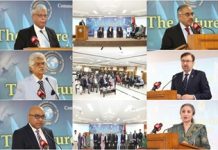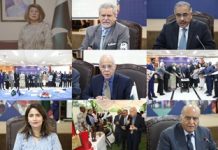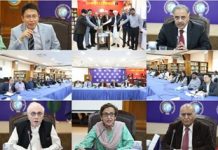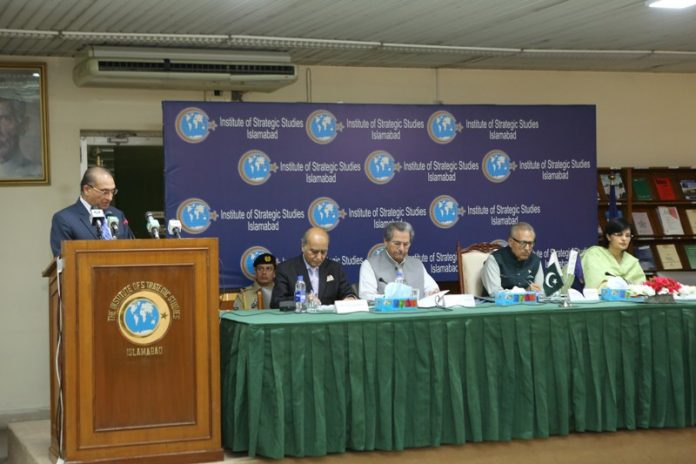PRESS RELEASE
National Seminar
on
Poverty Alleviation in Pakistan: Learning from Success Stories
July 10, 2019
“Success is when modern day capitalism allows the poor to come to par with the rich and put an end to the vicious cycle of poverty. Opinion makers need to be sensitized to the problems faced by the common man. In fact, every member of society needs to be conscious of this.” This was stated by Honorable Dr. Arif Alvi, President, Islamic Republic of Pakistan, during his address as Chief Guest at a National Seminar on “Poverty Alleviation in Pakistan: Learning from Success Stories”, organized by the Institute of Strategic Studies Islamabad (ISSI) today.
The working session of the seminar was chaired by Honorable Dr. Sania Nishtar, the Prime Minister’s Special Aide on Social Protection and Poverty Alleviation, while Honorable Mr. Shafqat Mahmood, Federal Minister for Education was the Keynote Speaker.
Members of the diplomatic corps in Islamabad, academics, civil society, and former and current diplomats were also in attendance. The speakers at the Seminar included: Mr. Qazi Asmat Isa, CEO of the Pakistan Poverty Alleviation Fund; Mr. Khaleel Ahmed Tetlay, Acting-CEO Rural Support Programmes Network (RSPN), and Ms. Fatima Rasheed, Director Parwaaz, Akhuwat Foundation.
Dr. Alvi said that unlike the previous governments, the present government is bent on revitalizing the ethos of Islam. Islam, he emphasized, has a long history of taking care of the people. Taking care of each other is among a Muslim’s prime responsibilities. He said that corruption has a direct link to poverty. People are less concerned about intangible things, which are the pillars of democracy and development and need to be conscious about material poverty. The distribution of money needs to be in areas where people have knowledge about how to utilize the funds in an effective manner. Dr. Alvi outlined how charity organizations are a remarkable illustration of how a society jumps in where the state has not been able to. The present government aims to alleviate poverty by not only through provision of food and financial assistance, but through initiatives of empowering women, especially by addressing the inheritance problem. He also mentioned malnourishment and stunting as issues of primary concern and said that different ministries such as health, poverty alleviation and education need to work together and help the state to re-establish the balance.
During her remarks in the inaugural session, Dr. Nistar observed that the State of Pakistan now realizes that security has many dimensions and human security is a very important element of this. She stated that in today’s day and age, the real wealth of a country lies in its human capital. She went on to outline the basic pillars of the ‘Ehsaas Program’ and called the initiative a practical illustration of what happens when a country’s policy translates into practical steps. Dr. Sania said that in a world where Pakistan has a negative image, the resilience and the spirit of comradery of the Pakistani people need to be projected. Among other things, the Ehsaas program also targets job creation – specifically skills training, the IT sector, and overseas Pakistanis. Coordinated policy interventions can create more jobs, something we are working aggressively for, she said.
In his keynote address, Mr. Shafqat Mahmood said that in Pakistan there is a great deal of ehsaas in society as can be envisaged in the charity levels which are among the highest in the world. The Ehsaas program has direct mandate to address issues of poverty and has that spirit of rising to this challenge. In Pakistan, there is an education apartheid where the society is divided into segments with one extreme never having had education, while the other extreme go to elite schools. This manifestation leaves behind a lot of people. Through initiatives such as introducing a single national curriculum, the government aims to address the equity issue, as well as help rectify the fractured mindset of the nation. Literacy is a tough area to address and poverty is a major reason for not sending children to school. In the success of Ehsaas, lies the success of Pakistan, he concluded.
Mr. Asmat said that in all development programs, it is important to factor in the heterogeneity of Pakistan because this enriches our culture – each district with its distinct features requires different blueprints. It is also important to improve governance at local levels and imperative to track and keep a record of all progress being made. He stated that underpinning all endeavors are five non-negotiable values which are inclusion, participation, transparency, accountability and stewardship. While giving his remarks, Mr. Tetlay said that poverty lies at the household level, the household members suffer from it. Each household has the potential to improve its own livelihoods and status. But in order to harness this potential, proper guidance and organization is needed. For social guidance, there are three tenets: the principle of organization, access to capital, and improved skills including technical skills, as well as soft skills. He also talked about how one organization cannot do everything. All stakeholders have to follow an integrated approach. RSPN’s main task is to mobilize and offer a platform through which the government can reach out to millions of people, he said. Ms. Rasheed talked about the work being done by Akhuwat Foundation which has built relationships of mutual support across the country. Understanding poverty should just be a question of justice, she said. She talked about lessons one can learn from Akhuwat which include that microfinance is viable, it is possible to work with indigenous institutions, and that the development process has to be organic and has to evolve. What is remarkable is that Akhuwat has managed to transform its borrowers into donors, she said. It is important that the Government of Pakistan should have a consolidated and coordinated window for charity, she concluded.
Earlier, in his welcome remarks, Director General ISSI, Ambassador Aizaz Ahmad Chaudhry said that for Pakistan, like many other developing nations, poverty is a real issue, connected directly to the lives of millions of people. One only has to look at indicators such as the United Nations’ Human Development Index to know that the challenge to eliminate poverty in Pakistan is actually growing. In this regard, the launching of Prime Minister Imran Khan’s Ehsaas initiative to alleviate poverty in Pakistan was heartening and a welcome start. “Unless we meet the basic needs of food, clothing and shelter, basic education and health for our fellow citizens, and unless we rise up the ladder of human development, we cannot aspire to achieve our lofty goals as a nation,” he said.












